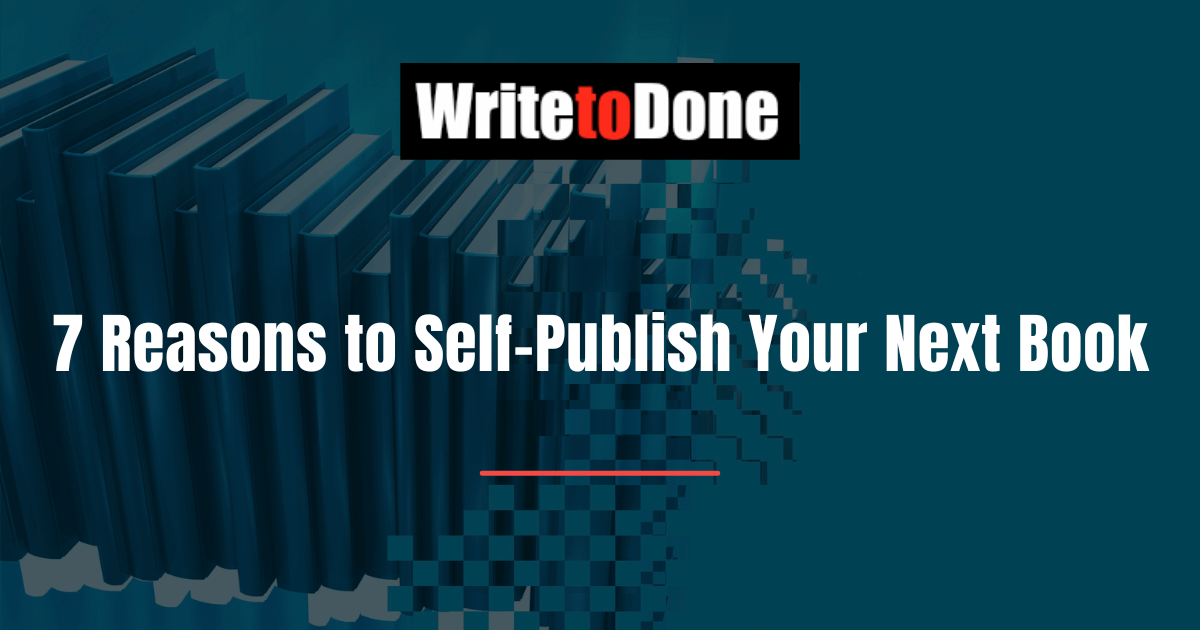When you think about self-publishing, what springs to mind?
Among some sections of the author and reader community, self-publishing has something of a bad reputation.
Sometimes, that’s down to nothing more than snobbery. Some people see how self-publishing has broken down the barriers to entry for authors and see that as a bad thing.
Other times, a negative view of self-publishing stems from confusion. Many people mistakenly believe it’s the same thing as vanity publishing.
If you’re at the stage in your writing life where you’re ready to release a book, you might have considered whether self-publishing is a viable route for your work.
No matter how you feel about self-publishing at the moment, here are seven reasons that it might be the best way forward for your next book.
Your book will be released much faster
If you’ve written a complete book, congratulations! It wasn’t exactly a quick process, right?
Well, if you decide to pursue traditional publishing, it might just be at the start of a very long journey.
Even after you get a completed manuscript to a publisher, it can take years before your book sees the light of day.
It’s not even like you can use those years to fully focus on a new project. At some point, you’ll have to get out there and promote the book you finished years ago in the way your publisher demands of you.
On the other hand, if you decide to self-publish, you can make things happen a lot quicker.
You can write and release several self-published books in the time it would take a traditional publisher to release a single one.
You get a better royalty rate
A lot of people assume that traditional publishing is automatically a better financial choice than going the indie author route.
If you look at outlier authors at the very elite end of the traditional publishing scale, they do make a lot of money. But outside of the Stephen Kings and J.K Rowlings of the world, things look a little bit different.
When your book is released by a traditional publisher, it will earn you about $1 or $2 for every copy sold.
On the other hand, if you choose to self-publish, you can determine your own pricing and keep around 70% of the revenue generated.
You enjoy complete creative freedom
Authors are, by definition, creative people.
However, if you sign a traditional publishing deal, you might have to compromise your creative freedom.
Your publisher will have a say over absolutely everything, and there is a lot of pressure to comply with their wishes, especially as a new author.
Even J.D Salinger had famous disputes with his publisher about his book covers!
If you want to retain full creative freedom over your book, and the people who work with you on it, self-publishing is the only way to go.
You don’t have the pressure of an advance
When people dream of being traditionally published, they often get excited about the prospect of a book advance.
While it might be nice to receive an upfront payment for your book, it’s important to understand how advances really work.
First, the amount isn’t as much as many people imagine. If you’re getting a publishing deal for the first time, you’ll probably receive an advance of around $5,000 to $15,000 dollars.
As few as 3 in 10 books actually do well enough to recoup the advance. Even if your book is in that small minority, you will only receive income from your sales twice a year.
By all means enjoy daydreaming about the glamor of a big book advance. Just be aware that the reality is probably going to look a lot different.
You can work in a way that fits around your lifestyle
A lot of traditional authors find the demands of their publisher take a big toll on their ability to live the life they want.
As an indie author, you have full freedom to work according to your own schedule. If you need to take some time off for a mental health break or to engage in self-care, you can. If you want to completely avoid in-person events, that’s your right. But when your work belongs to a traditional publisher, you have to do things in the way they prefer.
If you’re the kind of person who wants to live, work, and write at your own pace, be aware that your ability to do all of these things will be severely compromised by a traditional publishing contract.
You can still enjoy the same levels of quality
If you’re worried about self-publishing books being lower quality than their traditional counterparts, that’s not an entirely unfounded perspective.
Indie authors do sometimes harm the reputation of the self-publishing industry by putting out books with low-quality covers or blatant editing errors.
But, as easy as it is to find an example of a somewhat shoddy indie book, it’s just as easy to find a book completely indistinguishable from the output of a traditional publisher.
As a self-publisher, you can work with the creative partners of your choice. If you want to hire a book cover designer who’s worked with traditionally published authors, you have the freedom to do so.
You retain full rights over your work
Another problem faced by traditionally-published authors is a lack of contractual freedom over their work.
This impacts everything from the ability to sell books in a foreign market to the right to create an audiobook or other adaptation.
Self-published authors have none of these restrictions. As an indie author, you can sell your book wherever you want, whenever you want, and in any format of your choosing.
Which route is right for your book?
Hopefully, you now see that the world of traditional publishing isn’t everything people imagine it to be.
That’s not to say that traditional publishing is devoid of benefits. Traditional publishers often have a wealth of experience and there’s a certain amount of bragging rights that comes with landing a deal.
However, for the vast majority of authors, self-publishing is likely to make better sense financially, grant more creative freedom, and allow for faster progress.
By all means, choose whichever route you feel is best for your next book.
Just be honest with yourself about what you’re signing up for!

















